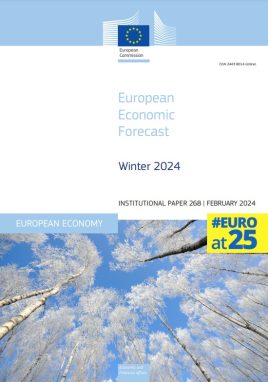
“In 2023, growth was held back by the erosion of household purchasing power, strong monetary tightening, the partial withdrawal of fiscal support and falling external demand. After narrowly avoiding a technical recession in the second half of last year, prospects for the EU economy in the first quarter of 2024 remain weak”.
 The European Commission’s Economic Forecast cites a number of elements. “However, economic activity is still expected to accelerate gradually this year. As inflation continues to abate, real wage growth and a resilient labour market should support a rebound in consumption”. Indeed, the recovery should be visible, also from the data, next year. “Despite falling profit margins, investment is set to benefit from a gradual easing of credit conditions and the continued implementation of the Recovery and Resilience Facility. In addition, trade with foreign partners is expected to normalise, after a weak performance last year”.
The European Commission’s Economic Forecast cites a number of elements. “However, economic activity is still expected to accelerate gradually this year. As inflation continues to abate, real wage growth and a resilient labour market should support a rebound in consumption”. Indeed, the recovery should be visible, also from the data, next year. “Despite falling profit margins, investment is set to benefit from a gradual easing of credit conditions and the continued implementation of the Recovery and Resilience Facility. In addition, trade with foreign partners is expected to normalise, after a weak performance last year”.
European Commission Vice-President Valdis Dombrovskis said: “After a bruising 2023, the European economy has emerged a little weaker than expected, although the rebound should speed up gradually this year and into 2025. Inflation continues its broad-based decline; real wage growth coupled with a resilient labour market should help
